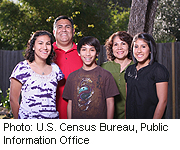
FRIDAY, Feb. 13, 2015 (HealthDay News) — Discrimination-related stress may affect the mental health of Latino teens born in the United States more than teens born in other countries, a new study finds.
“Although there is no difference in the amount of discrimination-related stress between native- and foreign-born immigrants, the effect of that stress is more detrimental to native-born immigrants over time,” said study leader Selcuk Sirin, an associate professor of psychology at New York University.
The research included 173 Latino students at New York City high schools who completed questionnaires about stress caused by discrimination, symptoms of anxiety and depression, and sleeping habits.
The students — some born in the United States and others who were foreign-born — filled out the questionnaires three times between grades 10 and 12.
During that time, mental health improved overall for all students. There were decreases in symptoms of anxious depression (nervousness, fearfulness, agitation) and in sleep problems. The researchers also found that symptoms of withdrawn depression (feeling worthless, lonely) fell between grades 10 and 11. But symptoms of withdrawn depression increased slightly again in 12th grade.
Discrimination-related stress was strongly linked with increases in symptoms of anxiety and depression in Latino students born in the United States, but not in those who were immigrants, the study found.
A possible explanation is that foreign-born teens are protected by having a stronger attachment to their Latino heritage, the researchers said.
“Our results shed light on the immigrant paradox, where second-generation immigrants fare worse than first-generation immigrants in a number of areas, including mental health,” Sirin said in a Society for Research in Child Development news release.
The study was published recently in the journal Child Development.
Latinos are the largest and fastest-growing ethnic minority in the United States (15 percent of the population). Almost one-third of Latinos in the country are teens. Nearly half of all Latino adults say they experience discrimination daily, according to the researchers.
“Overall, the pattern of increasing mental health over time demonstrates psychological strength and resiliency among Latino immigrants,” Sirin said.
“But people who work with these individuals should bear in mind the damaging effects of discrimination on mental health, particularly for those who were born in the United States. Being aware of the role of discrimination-related stress can help professionals be more sensitive, and thus more effective, in their efforts to help Latino youth flourish.”
More information
The American Psychiatric Association has more about mental health and Latinos.
Copyright © 2026 HealthDay. All rights reserved.

